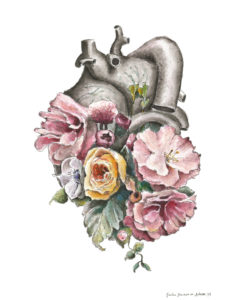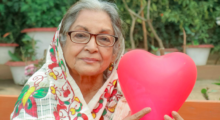Today SevenPonds speaks with Nika Short, who works for LifeCenter Northwest to provide support for the families of organ donors. Nika provides bereavement support for donor families and facilitates communication between donor families and organ recipients when someone decides they want to reach out.

Nika Short
Ellary: Hi Nika, thank you so much for being willing to speak with SevenPonds. Can you start by giving us a little background on yourself and how you started working with families of organ donors?
Nika Short: My background is in mental health. I have a masters degree in marriage and family therapy. I spent a year and a half working in community mental health, and I was experiencing a lot of institutional stress working in underfunded and poorly managed places. So I was casually looking around for another job. Then a friend who was working in this organ donation organization called LifeCenter Northwest reached out to me with the idea that it might be a good fit for me.
Organ donation is all federally regulated so there’s only one organization for each region, and LifeCenter Northwest is the organ procurement organization for the Pacific Northwest. I had done some work with an organization providing emotional support and long-term bereavement care to people with HIV and AIDS. So I knew I liked working in the areas of end of life, grief and loss,but I didn’t know very much about organ donation at all before I started working at LifeCenter.
Ellary: What was the first job you had in organ donation support?
Nika: I was what’s called a donation and family advocate. I was working “on call” for seven days at a time and then off for seven days. During your seven days on you’re basically on deck to get called out to a hospital where there’s a potential organ donor. When you get called out you pack a bag and head off to the hospital where that potential donor is.
Once I got there I would talk to the family. If the donor was registered, I would talk to them about their loved one’s registry status. If the donor wasn’t registered, I talk to the family about the possibility of organ donation and ask for their authorization. It was very much trauma-based counseling and support.
Ellary: That sounds intense. How was that job for you?
Nika: I loved it. It was very intense. There’s a lot of trauma. People who are organ donors aren’t generally dying of natural causes — it’s a lot of suicides and overdoses and car accidents and other very traumatic end-of-life scenarios. There’s a lot of trauma. Most families of organ donors are still in shock in the hospital, and I found that I was honored to be there at that time and offer them support. Being on call with that 7 on, 7 off schedule and being called in the middle of the night was hard to manage. I live in Seattle and we serve Washington, Montana, Alaska and Idaho. So I could get a call at two o’clock in the morning telling me I needed to get on a plane to Alaska in two hours.
Ellary: How much time would you generally spend with the families of organ donors?
Nika: Assuming the families said yes to donation or their loved one was registered, I would stay with them from that initial conversation through the time that their loved one went to the operating room for their organ recovery surgery. That could be anywhere from…I think my shortest case was eight hours…to five days. So I would stay at a hotel close to the hospital to be with the family as much or as little as they needed.
Ellary: So you were sort of on call for the family as well?
Nika: Yes. So if they are having a difficult time in the middle of the night and need support, I’d go to the hospital and try to walk them through it. I was essentially the communication point for the family about the donation process, sharing with them what to expect and helping them say goodbye while they had these extra days with their loved one. We would do a lot of memory-making things like hand prints on a quilt or other end-of-life care rituals.
Ellary: Did you find a lot of ambivalence amongst the family members about organ donation?
Nika: It varied so much. Sometimes families were instantly excited about donation and found comfort from it right away, knowing that their loved one was going to save people’s lives. Other times families were very angry that I’d even come to talk to them. And there was everything in between. Sometimes there would be a donor who was registered, which is like writing a will. Registering to be an organ donor is legally binding and sometimes the family didn’t want them to be a donor. And the families wouldn’t want them to be a donor. Then I would have to go through the process of dealing with the family trying to revoke patient’s wishes, which was probably the most difficult scenario that I dealt with.
However, the only reason I could do that job and enjoy it was that most of the time it really did seem to bring comfort to people at a time when they needed that. It meant that this unavoidable loss could be turned into something positive. And then they have the potential to be in contact with recipients down the road and that brings families so much joy.
Ellary: So you were a donation and family advocate, and now you have a different role. What’s your position now?
Nika: Yes, I moved from an on-call position to the office, which is in Bellevue, Washington. I still do family support, but I do it after the donation happens. First, I follow up with the families of organ donors for at least 18 months after donations. I support them over the phone and send out bereavement materials and information about organs and tissues. We also put on events a couple times a year and invite families to celebrate organ donors and the families of organ donors and honor their lives. I help put on those events and support families through that as well.
Ellary: How often are you in contact with those families?
Nika: I call every organ and tissue donor family about three weeks after donation takes place. Following that I’m in touch by mail and by phone as much as they want. So it totally varies from family to family. The other thing we do is facilitate communication between families of organ donors and organ recipients. The letters and the cards initially go through us. And then down the line, if families want to meet up or have more direct communication, we help them make that contact.
Ellary: Are there any relationships that have developed between the families of organ donors and recipients that have really stood out for you?
Nika: Well, there was one particular outlier situation where the heart recipient and the donor’s sister got married. They sometimes come and speak at presentations we give because it’s such an unusual and amazing story. In my current role I will sometimes get to be present when donor families meet their loved one’s recipient for the first time. That’s the place where organ and tissue donation can really bring comfort to the donor families.
Ellary: Thank you so much, Nika, for speaking with SevenPonds and for the work you do!
Nika: You’re welcome!

 How Do Professionals Provide Support For Families of Organ Donors?
How Do Professionals Provide Support For Families of Organ Donors?




 Having an Estate Plan Is Essential – So Is Discussing It With Your Children
Having an Estate Plan Is Essential – So Is Discussing It With Your Children

 “Summons” by Aurora Levins Morales
“Summons” by Aurora Levins Morales














